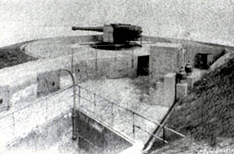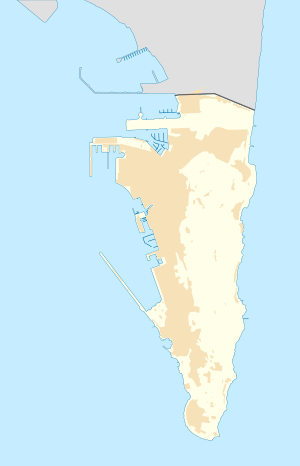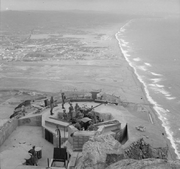Princess Royal's Battery
Princess Royal's Battery is an artillery battery in the British Overseas Territory of Gibraltar. It is located on Willis's Plateau at the northern end of the Upper Rock Nature Reserve, just southeast of Princess Anne's Battery. Formerly known as Willis' Battery, and later, Queen Anne's Battery or Queen's Battery, it was renamed in the late 18th century after Charlotte, Princess Royal, the eldest daughter of George III. The battery was active from the early 18th century until at least the mid-20th century. However, it has been decommissioned and guns are no longer present. Princess Royal's Battery is listed with the Gibraltar Heritage Trust.
| Princess Royal's Battery | |
|---|---|
| Part of Fortifications of Gibraltar | |
| Upper Rock Nature Reserve, Gibraltar | |
 Princess Royal's Battery in 1903 with 6 inch BL Mark VII gun | |
 Map of a portion of Willis's Plateau, including Princess Anne's Battery, Princess Amelia's Battery, Willis' Magazine and Princess Royal's Battery | |
 Princess Royal's Battery | |
| Coordinates | 36.146180°N 5.346166°W |
| Type | Artillery Battery |
| Site information | |
| Owner | Government of Gibraltar |
| Site history | |
| Built | c. 1705 |
| In use | Decommissioned |
Early history
Princess Royal's Battery is in Gibraltar, the British Overseas Territory at the southern end of the Iberian Peninsula.[1][2] The artillery battery is one of several located on Willis's Plateau, named after a British artillery officer commended for his actions during the capture of Gibraltar in 1704.[3][4] During the early 18th century, the batteries on that plateau were referred to as the Willis's Batteries.[5][6][7] Princess Royal's Battery is positioned at the northern end of the Upper Rock Nature Reserve, southeast of Princess Anne's Battery, and in proximity to the entrance to the Middle Galleries, the 18th century tunnels.[8][9][10]
While referred to in the early 18th century as Willis's Battery, it was later known as Queen Anne's Battery or Queen's Battery.[4][9] After the Great Siege of Gibraltar (1779–1783), it was again renamed after Charlotte, Princess Royal (1766–1828), the eldest daughter of King George III (1738–1820) and Queen Charlotte (1744–1818).[9][11] In 1797, at age 30, the Princess Royal married Frederick, the Crown Prince of Wurttemberg (1754–1816).[11]
The battery was constructed about 1705, "upon the second declivity" at the north end of the Rock of Gibraltar.[12] It had a fan-like plan and, in 1727, featured twelve guns.[9] At that time, "nearly all the guns in Willis's were six-pounders, and in the journal of the siege it is mentioned that a three-pounder in Queen Anne's battery did great execution in the enemy's works."[13] That year, the guns at Queen's Anne's Battery were sufficiently effective during the thirteenth siege of Gibraltar that the Spanish officers were prompted to devise a plan to silence them. They started a mine in a cave below the battery, the intent being to excavate a chamber directly below the battery, load it with explosives, and blow it up. However, the undertaking required a great deal of labour. Not only was the rock hard, but the mine was started at a considerable height, close to the battery, not at the base of the Rock. The effort was ultimately unsuccessful.[14][15][16]
In February 1782, Princess Royal Battery was the site of the first use of Lieutenant George Koehler's depressing gun-carriage.[17] This allowed the angle of the gun to be aimed down at an angle of seventy degrees. This enabled the defending soldiers to take advantage of the height of the Rock of Gibraltar. It was ingenius because the sliding carriage allowed the gun to recoil without sending the gun carriage into the air. This idea was later built into more conventional gun carriages.[18] Colonel John Drinkwater in his accounts claimed that the gun hit its target 28 times out of 30 when aimed at the Spaniard's San Carlos Battery.
In August 1782, during the Great Siege of Gibraltar, the Garrison strengthened the works at Willis's Plateau, and orders went out for the Princess Royal's Battery "to be caissoned with ship-timber."[19]
In the period from 1834 to 1859, Princess Royal's Battery had nine 24-pounders. However, four years later, by 1863, the guns had been switched out for two 7-inch (180 mm) rifled breech loaders and seven 32-pounders. There were further changes later that century. The battery mounted five 64-pounder rifled muzzle loading guns in 1885 and three of the same in 1889. About that time, a proposal was made to mount a 6-inch breech loading Mark IV gun. A drawing (pictured below) made of Princess Royal's Battery in 1895 includes not only the 6-inch emplacement, but also Gun No. 1 of Princess Anne's Battery.[9]
Recent history


In 1901, approval had been given for two 6-inch (152 mm) guns at Princess Royal's Battery. One emplacement was to have a range of 6,000 yards (5,500 m), to bear on the enemy's land batteries. The other was to feature double the range, 12,000 yards (11,000 m), to target vessels on the Mediterranean. On 21 July 1902, work began on a 6-inch breech loading Mark VII gun with barbette armour. By November 1903, that 6-inch BL Mark VII gun had been mounted, as documented in a photograph (pictured above) of that date, with the installation finished by 24 May 1904. In December 1915, the second 6-inch breech loading Mark VII gun was mounted on the battery. It is believed to have stayed there until about 1924–1925.[9] By World War II, at least one gun was still present, a Bofors 40 mm anti-aircraft gun, as documented in an Imperial War Museum photograph (pictured at left).[20]
The battery features subterranean, bombproof storage areas for shells and cartridges. Underground, there are also shell hoists and a room for the gun crew.[9][21] The largest room inside the entrance to the left has sustained heavy vandalism (B in diagram). A central hallway runs the length of the underground complex (C). Interior windows, lighting holes, along that corridor helped to avoid the risk of interaction of flame and gunpowder (D).[21][22] Wooden doors at the entrance of the shell storage room are extant, but their condition was poor as of 2005 (E).[21]
Princess Royal's Battery is protected as a listed building under the Gibraltar Heritage Trust Act 1989.[23]
Gallery
 1895 drawing of battery incl. Gun No.1 of Princess Anne's Battery
1895 drawing of battery incl. Gun No.1 of Princess Anne's Battery 2005 exterior view of Princess Royal's Battery upper level
2005 exterior view of Princess Royal's Battery upper level 2005 exterior view of Princess Royal's Battery upper level
2005 exterior view of Princess Royal's Battery upper level 2005 exterior view of Princess Royal's Battery upper and lower levels
2005 exterior view of Princess Royal's Battery upper and lower levels 2005 exterior view of battery's underground complex, (A) in diagram
2005 exterior view of battery's underground complex, (A) in diagram
References
- "List of Crown Dependencies & Overseas Territories". fco.gov.uk. Foreign and Commonwealth Office. Retrieved 20 October 2012.
- Roach, John (10 October 2006). "Neandertals' Last Stand was in Gibraltar, Study Suggests". National Geographic News. National Geographic Society. Retrieved 20 October 2012.
- Ehlen, Judy; Harmon, Russell S (2001). The Environmental Legacy of Military Operations (illustrated ed.). Geological Society of America. p. 110. ISBN 9780813741147.
- Drinkwater Bethune, John (1786). A history of the late siege of Gibraltar (2 ed.). p. 65. Retrieved 22 October 2012.
- Solas Dodd, James (1781). The ancient and modern history of Gibraltar. With an accurate journal of the siege of that fortress, Feb. 13 to June 23, 1727. p. 195. Retrieved 23 October 2012.
- "Princess Anne's Battery No.4 Gun (E)". discovergibraltar.com. DiscoverGibraltar.com (Click Upper Rock Nature Reserve, Princess Anne's Battery, then E 360 view at No.4 Gun). Archived from the original on 5 September 2013. Retrieved 23 October 2012.
- "Princess Anne's Battery No.1 Gun (A)". discovergibraltar.com. DiscoverGibraltar.com (Click Upper Rock Nature Reserve, then Princess Anne's Battery). Archived from the original on 5 September 2013. Retrieved 23 October 2012.
- "Google map of Princess Royal's Battery". maps.google.com. Google Maps. Retrieved 22 October 2012.
- "Princess Royal's Battery (F)". discovergibraltar.com. DiscoverGibraltar.com (Click Upper Rock Nature Reserve, Princess Anne's Battery, then F Princess Royal's Battery). Archived from the original on 5 September 2013. Retrieved 20 October 2012.
- "Site Name: Gibraltar – Princess Anne's Battery". subbrit.org.uk. Subterranea Britannica. Retrieved 23 October 2012.
- Beatty, Michael A (1 April 2003). The English Royal Family of America, from Jamestown to the American Revolution. McFarland. pp. 192–194. Retrieved 22 October 2012.
- Solas Dodd, James (1781). The ancient and modern history of Gibraltar. With an accurate journal of the siege of that fortress, Feb. 13 to June 23, 1727. p. 60. Retrieved 22 October 2012.
- Sayer, Frederick (1865). The history of Gibraltar and of its political relation to events in Europe (2 ed.). Chapman and Hall. p. 204. Retrieved 23 October 2012.
Queen Anne's Battery, Gibraltar.
- López de Ayala, Ignacio (1845). The history of Gibraltar: from the earliest period of its occupation by the Saracens. W. Pickering. p. 167. Retrieved 22 October 2012.
Queen Anne's Battery.
- Encyclopædia Britannica; or A dictionary of arts, sciences, and miscellaneous literature, Volume 9 (6 ed.). Printed for Archibald Constable and Company. 1823. p. 707. Retrieved 22 October 2012.
- Gilbard, Lieutenant Colonel George James (1881). A popular history of Gibraltar, its institutions, and its neighbourhood on both sides of the Straits, and a guide book to their principal places and objects of interest. Garrison Library Printing Establishment. p. 7. Retrieved 23 October 2012.
- "Red Plaque at Grand Casemates Square". Government of Gibraltar. Retrieved 3 April 2013.
- Finlayson, Darren Fa & Clive (2006). The fortifications of Gibraltar : 1068-1945 (1. publ. in Great Britain. ed.). Oxford [u.a.]: Osprey. p. 29. ISBN 9781846030161.
- Drinkwater Bethune, John (260). A history of the late siege of Gibraltar (2 ed.). Retrieved 23 October 2012. Check date values in:
|year= / |date= mismatch(help) - "The British Army of Gibraltar 1941". iwm.org.uk. Imperial War Museums. Retrieved 20 October 2012.
- "Princess Royal's Battery underground facilities". discovergibraltar.com. DiscoverGibraltar.com (Click Upper Rock Nature Reserve, Princess Anne's Battery, F Princess Royal's Battery, then Click here for underground layout). Archived from the original on 5 September 2013. Retrieved 22 October 2012.
- "Princess Caroline's Battery and Military Heritage Centre". discovergibraltar.com. DiscoverGibraltar.com (Click Upper Rock Nature Reserve, then Princess Caroline's Battery and Military Heritage Centre). Archived from the original on 5 September 2013. Retrieved 23 October 2012.
- "Gibraltar Heritage Trust Act" (PDF). gibraltarlaws.gov.gi. Government of Gibraltar. Archived from the original (PDF) on 27 August 2012. Retrieved 20 October 2012.
